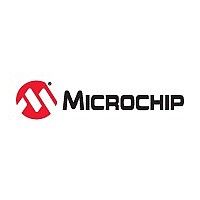PIC18F4550-I/ML Microchip Technology Inc., PIC18F4550-I/ML Datasheet - Page 78

PIC18F4550-I/ML
Manufacturer Part Number
PIC18F4550-I/ML
Description
44 PIN, 32 KB FLASH, 2048 RAM, FS-USB 2.0
Manufacturer
Microchip Technology Inc.
Datasheet
1.PIC18F4550-IML.pdf
(320 pages)
Specifications of PIC18F4550-I/ML
A/d Inputs
13-Channel, 10-Bit
Comparators
2
Cpu Speed
12 MIPS
Eeprom Memory
256 Bytes
Input Output
34
Interface
I2C/SPI/UART/USART/USB
Memory Type
Flash
Number Of Bits
8
Package Type
44-pin QFN
Programmable Memory
32K Bytes
Ram Size
2K Bytes
Speed
48 MHz
Timers
1-8-bit, 3-16-bit
Voltage, Range
2-5.5 V
Lead Free Status / Rohs Status
RoHS Compliant part
Electrostatic Device
- Current page: 78 of 320
- Download datasheet (6Mb)
PIC18F2450/4450
6.2.2
The Table Latch (TABLAT) is an 8-bit register mapped
into the SFR space. The Table Latch register is used to
hold 8-bit data during data transfers between program
memory and data RAM.
6.2.3
The Table Pointer (TBLPTR) register addresses a byte
within the program memory. The TBLPTR is comprised
of three SFR registers: Table Pointer Upper Byte, Table
Pointer High Byte and Table Pointer Low Byte
(TBLPTRU:TBLPTRH:TBLPTRL). These three registers
join to form a 22-bit wide pointer. The low-order 21 bits
allow the device to address up to 2 Mbytes of program
memory space. The 22nd bit allows access to the device
ID, the user ID and the Configuration bits.
The Table Pointer, TBLPTR, is used by the TBLRD and
TBLWT instructions. These instructions can update the
TBLPTR in one of four ways based on the table opera-
tion. These operations are shown in Table 6-1. These
operations on the TBLPTR only affect the low-order
21 bits.
TABLE 6-1:
FIGURE 6-3:
DS39760A-page 76
TBLRD*
TBLWT*
TBLRD*+
TBLWT*+
TBLRD*-
TBLWT*-
TBLRD+*
TBLWT+*
Example
21
TABLE LATCH REGISTER (TABLAT)
TABLE POINTER REGISTER
(TBLPTR)
TABLE POINTER OPERATIONS WITH TBLRD AND TBLWT INSTRUCTIONS
TBLPTRU
TABLE POINTER BOUNDARIES BASED ON OPERATION
16
TABLE WRITE – TBLPTR<21:4>
15
TBLPTR<21:6>
TABLE ERASE
Advance Information
TABLE READ – TBLPTR<21:0>
TBLPTR is incremented before the read/write
TBLPTR is decremented after the read/write
TBLPTR is incremented after the read/write
TBLPTRH
Operation on Table Pointer
TBLPTR is not modified
6.2.4
TBLPTR is used in reads, writes and erases of the
Flash program memory.
When a TBLRD is executed, all 22 bits of the TBLPTR
determine which byte is read from program memory
into TABLAT.
When a TBLWT is executed, the four LSbs of the Table
Pointer register (TBLPTR<3:0>) determine which of the
16 program memory holding registers is written to.
When the timed write to program memory begins (via
the WR bit), the 16 MSbs of the TBLPTR
(TBLPTR<21:4>) determine which program memory
block of 16 bytes is written to. For more detail, see
Section 6.5 “Writing to Flash Program Memory”.
When an erase of program memory is executed, the
16 MSbs of the Table Pointer register (TBLPTR<21:6>)
point to the 64-byte block that will be erased. The Least
Significant bits (TBLPTR<5:0>) are ignored.
Figure 6-3 describes the relevant boundaries of the
TBLPTR based on Flash program memory operations.
8
7
TABLE POINTER BOUNDARIES
TBLPTRL
© 2006 Microchip Technology Inc.
0
Related parts for PIC18F4550-I/ML
Image
Part Number
Description
Manufacturer
Datasheet
Request
R

Part Number:
Description:
20-Pin USB Flash Microcontrollers
Manufacturer:
MICROCHIP [Microchip Technology]
Datasheet:

Part Number:
Description:
PIC18F With 128-segment LCD Driver And 12-bit ADC, 8KB Flash, 768B RAM, CCP, MSS
Manufacturer:
Microchip Technology
Datasheet:

Part Number:
Description:
PIC18F With 128-segment LCD Driver And 12-bit ADC, 16KB Flash, 768B RAM, CCP, MS
Manufacturer:
Microchip Technology
Datasheet:

Part Number:
Description:
PIC18F With 192-segment LCD Driver And 12-bit ADC, 8KB Flash, 768B RAM, CCP, MSS
Manufacturer:
Microchip Technology
Datasheet:

Part Number:
Description:
PIC18F With 192-segment LCD Driver And 12-bit ADC, 16KB Flash, 768B RAM, CCP, MS
Manufacturer:
Microchip Technology
Datasheet:

Part Number:
Description:
Microcontrollers (MCU) 48KB 3328 RAM 52 I/O
Manufacturer:
Microchip Technology
Datasheet:

Part Number:
Description:
Microcontrollers (MCU) 64KB 3328 RAM 52 I/O
Manufacturer:
Microchip Technology
Datasheet:

Part Number:
Description:
32kB Flash, 2kB RAM, 1kB EE, NanoWatt XLP, LCD 64 QFN 9x9x0.9mm T/R
Manufacturer:
Microchip Technology
Datasheet:

Part Number:
Description:
32kB Flash, 2kB RAM, 1kB EE, NanoWatt XLP, LCD 64 TQFP 10x10x1mm T/R
Manufacturer:
Microchip Technology
Datasheet:

Part Number:
Description:
128kB Flash, 4kB RAM, 1kB EE, 16MIPS, NanoWatt XLP, LCD, 5V 80 TQFP 12x12x1mm T/
Manufacturer:
Microchip Technology
Datasheet:

Part Number:
Description:
32kB Flash, 2kB RAM, 1kB EE, NanoWatt XLP, LCD 64 QFN 9x9x0.9mm TUBE
Manufacturer:
Microchip Technology
Datasheet:

Part Number:
Description:
32kB Flash, 2kB RAM, 1kB EE, NanoWatt XLP, LCD 64 TQFP 10x10x1mm TRAY
Manufacturer:
Microchip Technology

Part Number:
Description:
128kB Flash, 4kB RAM, 1kB EE, 16MIPS, NanoWatt XLP, LCD, 5V 80 TQFP 12x12x1mm TR
Manufacturer:
Microchip Technology











